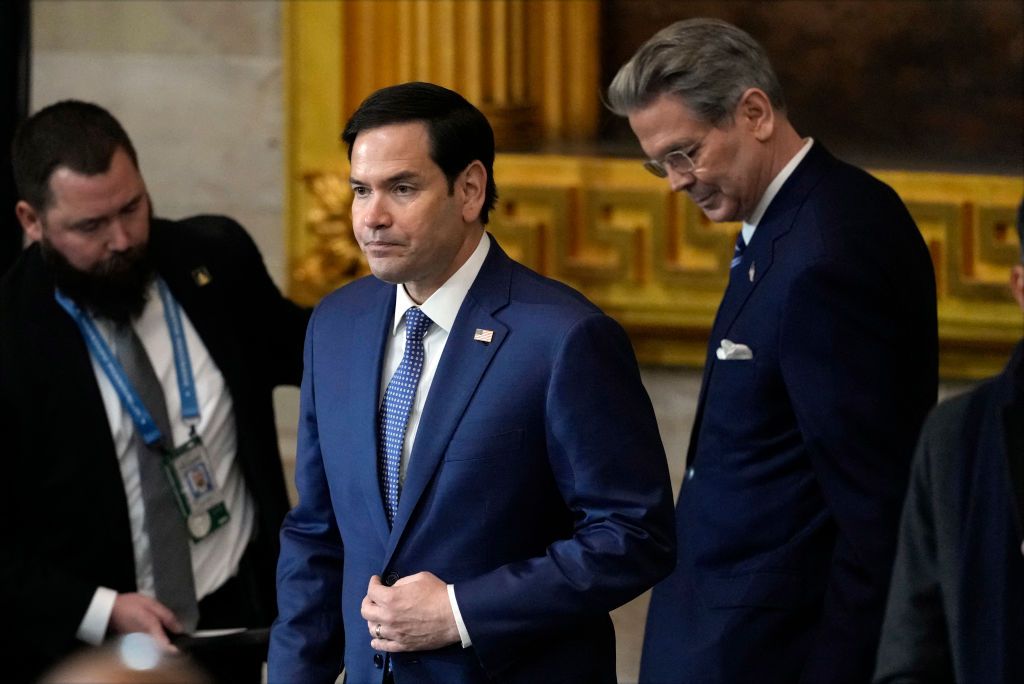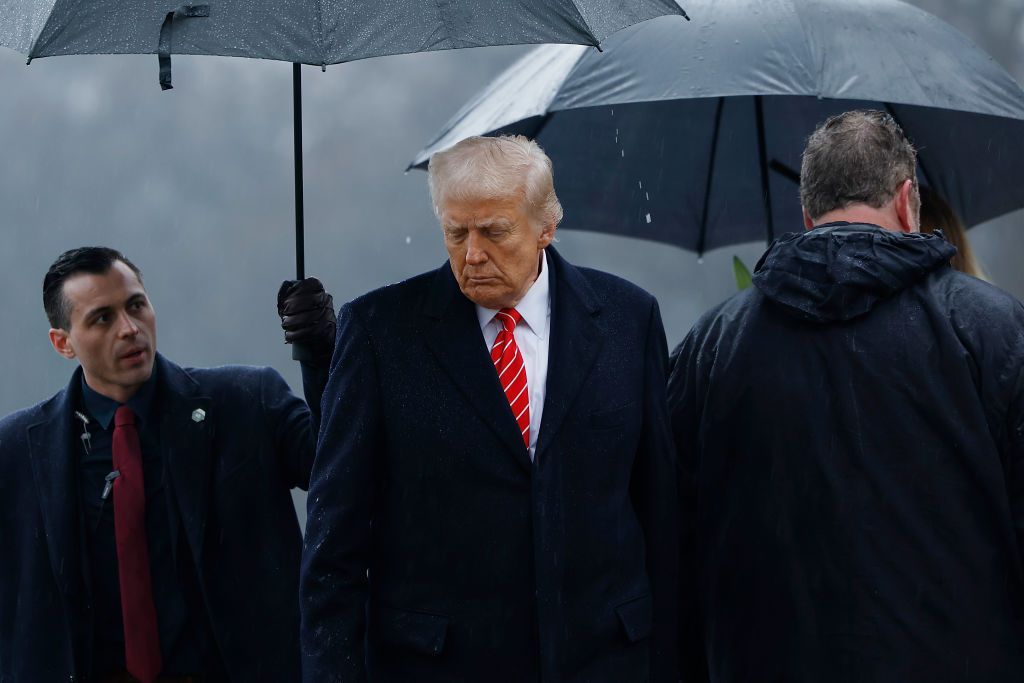‘A team of attention-seekers’ — Ukrainians react to Trump's Inauguration speech

U.S. President Donald Trump holds the hand of his wife, Melania Trump, as their son, Barron Trump, and Vice President J.D. Vance look on after taking the oath of office during inauguration ceremonies in the Rotunda of the U.S. Capitol in Washington, DC, on Jan. 20, 2025. (Morry Gash / Pool / Getty Images)
Donald Trump was sworn in as U.S. president on Jan. 20, giving a speech containing a bombastic series of announcements and executive orders, not to mention the declaration of two national emergencies.
Setting out the goals of his second term, with billionaires Elon Musk, Amazon's Jeff Bezos, and Meta's Mark Zuckerberg at his side, Trump took aim at everything from transgender rights and electric cars to drug cartels and a mountain in Alaska.
Yet he kept his comments on U.S. foreign policy relatively vague and general, and never once mentioned what is likely to be one of his administration's biggest challenges — ending Russia's full-scale invasion of Ukraine.
"We now have a government that cannot manage even a simple crisis at home, while at the same time stumbling into a continuing catalog of catastrophic events abroad," Trump said without elaborating which events he was referring to.
Trump declared open season on drilling for U.S. oil and gas, saying it was time to "drill baby, drill!" Although he didn’t speak about it in the speech, flooding global markets with U.S. oil and gas could potentially push down prices and box out Russian oil, the country's main source of revenue that it uses to fund its war in Ukraine.
A slightly stronger allusion to the war in Ukraine came when he criticized the administration of President Joe Biden for giving "unlimited funding to the defense of foreign borders" at what he said was the expense of "American borders, or, more importantly, its own people."
Trump also said he would "build the strongest military the world has ever seen," adding that success would be measured "not only by the battles we win, but also by the wars that we end and, perhaps most importantly, the wars we never get into."
"My proudest legacy will be that of a peacemaker and unifier. That’s what I want to be, a peacemaker and a unifier," he added.
Trump went on to highlight the ceasefire in Gaza which came into force the day before he was sworn in, but made no mention of any ceasefire or peace negotiations in relation to the war in Ukraine.
The new president campaigned on a message of ending the war in Ukraine within 24 hours. After his election, he has since admitted that bringing an end to the fighting in Ukraine will take much longer.
In terms of apparent concrete foreign policy actions his administration will undertake, Trump only made reference to the Panama Canal which he'd previously pledged to reassert U.S. control over.
"We’re taking it back," Trump said, accusing Panama of mismanaging the critical trade route and allowing China to take de facto control of it.
We asked six Ukrainians what they made of Trump's omission of Ukraine and Russia's full-scale invasion from his inauguration speech.
Volodymyr Aryev
lawmaker from the European Solidarity faction
Trump is the president of the United States, not of Ukraine. It’s understandable why his speech was focused on the U.S. I don’t see a huge problem in the fact that he didn’t mention Ukraine.
Aryev said that it's more important for him that Trump is planning to pressure Russian President Vladimir Putin to reach a peace deal and to increase oil production, which would reduce prices.
It's a bigger blow for Russia than any statements.

Yaroslav Yurchyshyn
lawmaker and head of the Ukrainian parliament's committee on freedom of speech
We understand that Trump will prioritize internal affairs over external matters. Like any political consultant will tell you, talking about something traumatizing in an inauguration speech is not as effective as something motivating.
"We understand that Trump will prioritize internal affairs over external matters."
We remember that Trump promised to finish the war in 24 hours, but even before the inauguration speech, he and his team understood, that for that goal, they needed much more time and that not hours, not days, not even months would be enough. And just after the inauguration speech, talking with the mass media, Trump said that he was ready to speak with Putin, but only after the beginning of the negotiation process.
Yes, for Ukraine it would have been better to have been mentioned in the inauguration speech because it (would) show that Ukraine, the end of the Russia-Ukraine war, is among the priorities for Trump's new term. But we know that it's not.
Artem Chapeye
author and soldier in the Ukrainian army
(Ending the war in) 24 hours is over, isn’t it? Elon Musk kind of overwhelmed even Trump with the show (Musk made a controversial salute in a separate speech later in the day).
I don’t believe it matters what they say publicly, it’s just a team of attention-seekers.

Mykyta Poturayev
lawmaker in President Volodymyr Zelensky's Servant of the People party
President Trump expressed his — so to speak — philosophy about wars in general. I'm referring to his view on the U.S.'s mission and role in ongoing or potential wars and conflicts.
This is enough for me personally (to understand his perspective). Now, seeing how (Trump will approach ongoing wars), it is necessary to work with him on a practical level.
'Volvo'
medic in the 166th brigade, Kupiansk
I can’t say if things will be better for us (now Trump has been inaugurated) because Trump is definitely not a sympathizer of Ukraine.
He loves himself and will make decisions and measures to keep face. He promised to stop the war in 24 hours. Well, in 24 hours, of course, he will not stop it.
But in any case, he will lead such a policy to keep face, his status, his machismo, so to speak. And in this spectrum of his vision, Ukraine is unlikely to be a priority.
Oleksandr Merezhko
lawmaker and chair of the Ukrainian parliament's foreign affairs committee
I’m not disappointed because it was expected. In fact, he implied Ukraine when he was talking about the need to finish the wars in the world, and to prevent them from breaking out.
Besides, Trump comes to power as, first and foremost most, the president who will focus on internal problems.
The crux of the matter is whether he can come up with a realistic plan to stop Russian aggression. As of now, I don’t see such a plan.
Additional reporting by Oleg Sukhov, Martin Fornusek, Kate Tsurkan, and Boldizsar Gyori.











